Considering how its second season concluded—not to mention the general madness of its scenario—it’s not altogether stunning to discover that in Squid Game’s third and final season, many of its characters are on the verge of going insane.
Faced with the ever-present specter of death, soul-crushing betrayals, nasty rivalries, frustrated desires, and bitter jealousies, everyone is at their breaking point as Hwang Dong-hyuk’s worldwide smash series comes to a close. Less a stand-alone run than a continuation of its prior outing, the Netflix show, returning June 27, is as taut, startling, and unhinged as ever. Moreover, it mercifully avoids falling victim to its preceding episodes’ shortcomings on the way to its do-or-die finish.
(Warning: Some spoilers ahead.)
Squid Game’s return picks up in the immediate aftermath of the failed uprising orchestrated by Seong Gi-hun (Lee Jung-jae), which cost the former winner-turned-insurgent his best friend Park Jung-bae (Lee Seo-hwan). Gi-hun hates himself for his buddy’s death, albeit not as much as he blames Kang Dae-ho (Kang Ha-neul), the (supposed) marine who, tasked with returning to the dormitories during the heat of battle to procure additional ammunition, froze, leaving his mates hopelessly stranded.
Gi-hun is returned to the game and, in the throes of misery, demands that the masked, pink-suited guards shoot him in the head. Alas, he’s denied an easy way out of this nightmare, getting handcuffed to a bedpost to prevent further outbursts and be forced to participate in the coming rounds.
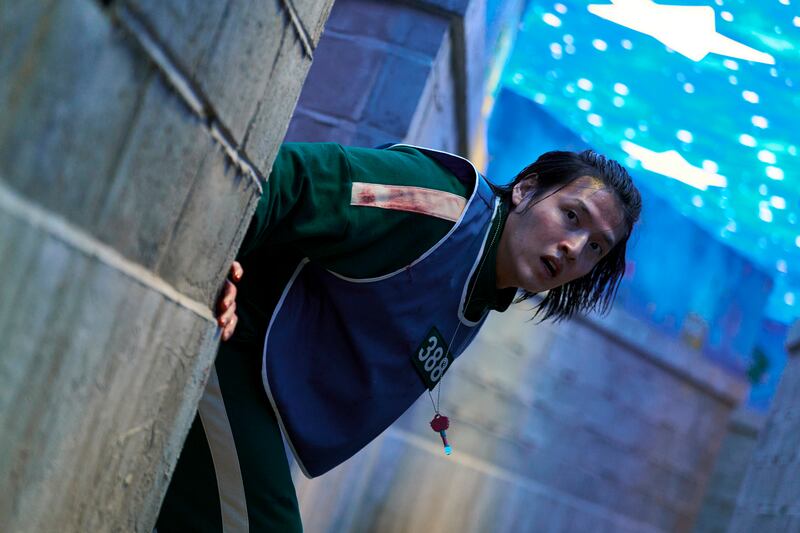
Gi-hun remains Squid Game’s primary player, yet the series’ sprint to the end is trifurcated between his ordeal and that of two others.
First is Kang No-eul (Park Gyu-young), one of the game’s guards, who rankled some of her comrades by not going along with their covert organ harvesting operation. At the outset of the premiere, No-eul opts to cooperate, shooting but not killing a competitor so he can be surreptitiously delivered to the basement where a doctor removes valuable body parts for sale on the black market.
This earns her the trust of her shady mates. However, it’s all a ruse, as the wounded man is Park Gyeong-seok (Lee Jin-wook), the father of the dying girl whom No-eul knew on the outside. Determined to make sure that the cancer-stricken kid doesn’t lose her dad, No-eul endeavors to sneak Gyeong-seok out of the game—a mission that eventually puts her in the crosshairs of the Masked Officer (Park Hee-soon).
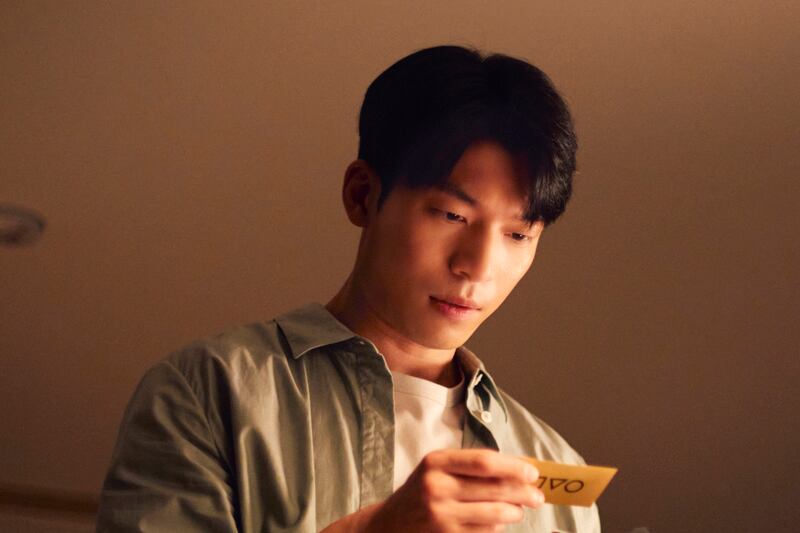
Intertwined with Gi-hun and No-eul’s threads is the ongoing quest of police officer Hwang Jun-ho (Wi Ha-joon) to locate the island where the game is being held so he can save everyone (including accomplice Gi-hun) before they perish and, just as importantly, so he can confront his brother In-ho (Lee Byung-hun), aka the Front Man, who oversees Squid Game and who shot Jun-ho in season one.
To do this, Jun-ho is boating around the region with Captain Park (Oh Dal-su), whose nefariousness is soon suspected by Choi Woo-seok (Jeon Seok-ho), and as before, this is easily the dullest segment of Squid Game’s return engagement. While Jeon Seok-ho gives the material an amusingly hyperactive kick, the subplot is merely a drawn-out prelude to Jun-ho inevitably locating the landmass for which he’s searched for the better part of 10 episodes.
Squid Game’s sophomore season took a frustratingly long time getting to its main action. Fortunately, that’s not the case here.
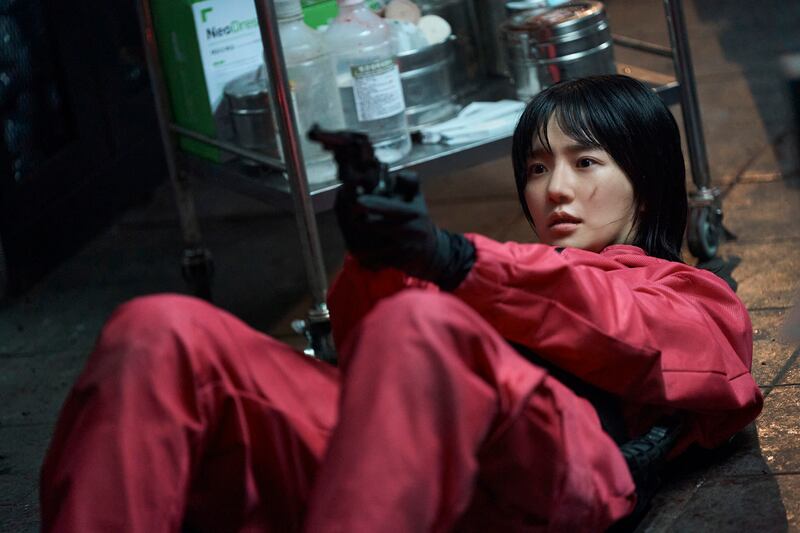
After catching its breath post-mutiny, the show dives right back into the murderous children’s games that are its entire reason for existing, beginning with Gi-hun and company playing a homicidal variation of Hide and Seek in which one team (the hiders) are given keys to doors (including the elusive Exit) and their adversaries (the seekers) are armed with knives and tasked with killing at least one hider in order to advance. Set in a confusing maze of hallways and staircases, it’s a match that strains not only loyalties but personal boundaries, and Dong-hyuk uses it to once again lay bare his characters’ greed, selfishness, heartlessness, and altruism.
Most everyone is headed for a grisly fate in Squid Game, yet there are numerous surprises sprinkled throughout these climactic six episodes which complicate the decisions and alliances made by its surviving heroes and villains. Dong-hyuk devises creative and harrowing fatalities for his most sympathetic figures, all as he ratchets up the hysteria through a potent cocktail of crushing guilt, deranged covetousness, and drug-addled mania.
Almost no one is operating with their head on straight, save for the Front Man, who maintains his stoic composure regardless of how each contest turns out—and despite being tasked with overseeing a collection of masked, English-speaking VIPs who blather on in the most insufferably artificial and unfunny manner imaginable.
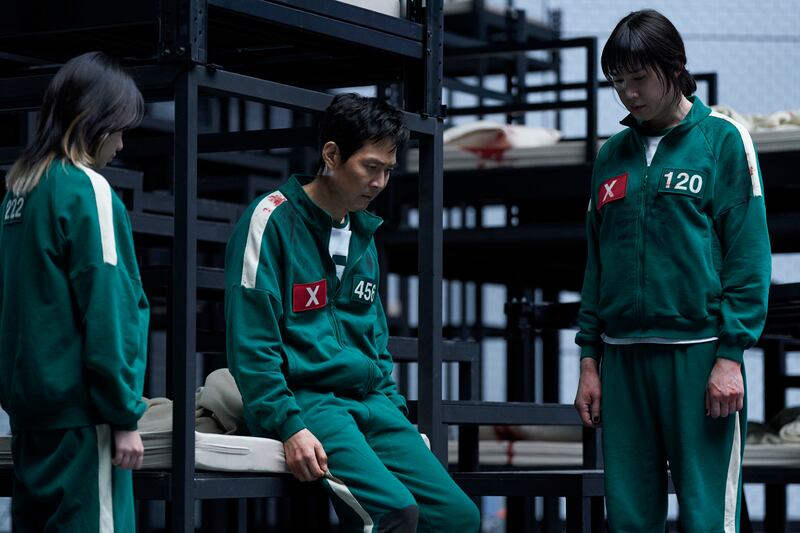
Designed as the back half of the story it began in December 2024, Squid Game’s third season satisfies by placing a premium on its lethal schoolyard bouts, all of which afford race-against-time opportunities for its well-drawn characters to reveal their true natures in the heat of the moment.
Dong-hyuk’s clean, colorful and symmetrical visual designs (dominated by primary hues and square, circle, and triangle shapes) are still striking, and so too is Jung-jae as Gi-hun, an increasingly broken and despairing crusader compelled to face his own fury (and culpability) at multiple points along his journey. No matter how many excellent supporting players it introduces and develops, the show rests on its lead’s shoulders, and his mixture of remorse, misery, and anger powers it through its few familiar, bumpy patches.
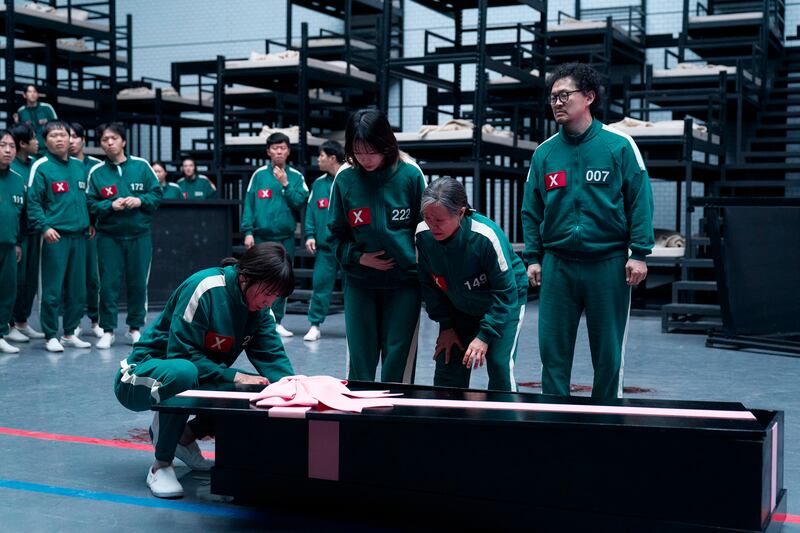
Ultimately, Dong-hyuk boxes himself into something of a narrative corner, thereby sabotaging a bit of suspense about who will wind up the last man (or woman) standing. Nonetheless, as befitting the sure-footedness of this season, he figures out a means of wrapping up his various concerns with equal measures of hope and despair—as well as drops a coda cameo that will leave jaws on the floor and, more importantly, leaves the door open for future (overseas?) series installments.
A show whose combination of sci-fi, horror, mystery, and interpersonal drama made it an international sensation, Squid Game ends as an alternately nerve-wracking and moving affair whose real game, ultimately, was exploring and exposing the meat grinder-esque ruthlessness of 21st-century society—and, with it, the best and worst of humanity.
The post ‘Squid Game’ Goes Out on a Gruesomely Lethal High Note appeared first on The Daily Beast.



